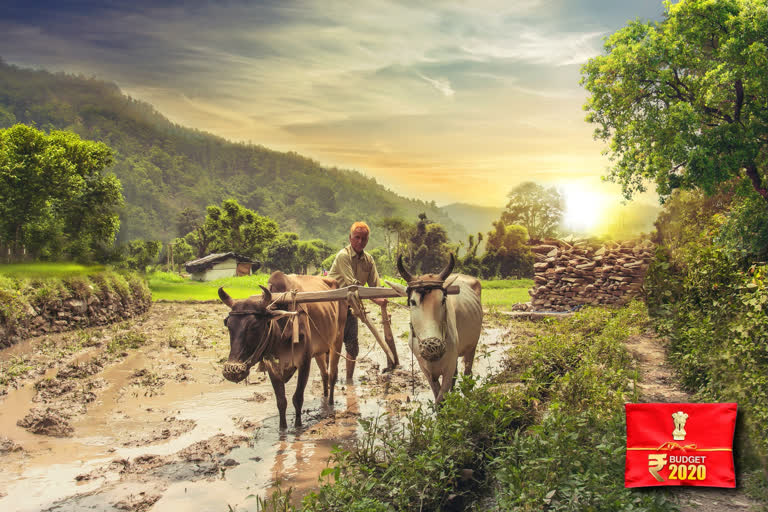ന്യൂഡൽഹി: ഇന്ത്യൻ സമ്പദ്വ്യവസ്ഥയുടെ നട്ടെല്ലാണ് കൃഷി. കർഷകരാണ് നമുക്ക് ജീവിക്കാൻ വേണ്ടതെല്ലാം നൽകുന്നത്. പക്ഷേ, സമ്പദ്വ്യവസ്ഥയുടെ കാർഷിക വിഹിതം (ജനസംഖ്യയുടെ 50% കർഷകരാണ്) കുറഞ്ഞു വരികയാണ്. ജിഡിപിയിലേക്കുള്ള കർഷിക മേഖലയുടെ സംഭാവന 2014-15ൽ 18 ശതമാനത്തിൽ നിന്ന് 2018-19ൽ 14 ശതമാനമായി കുറഞ്ഞു. ഈ പ്രവണത തടയുന്നതിന്, കേവലം പ്രഖ്യാപനങ്ങൾക്കപ്പുറത്തേക്ക് നീങ്ങേണ്ട സമയമാണിതെന്ന് വിദഗ്ദ്ധർ അഭിപ്രായപ്പെടുന്നു.
ബജറ്റ് 2020: കാർഷിക മേഖലയിൽ കൂടുതൽ നിക്ഷേപം ആവശ്യമാണെന്ന് വിദഗ്ദർ കാർഷിക ഉൽപാദനക്ഷമത ഉൾപ്പടെ വരുമാനം മെച്ചപ്പെടുത്തുന്നതിനുള്ള നിരവധി മാർഗ്ഗങ്ങൾ സ്വീകരിക്കണമെന്ന് എംഎസ് സ്വാമിനാഥൻ പറഞ്ഞു. ഉദാഹരണത്തിന്, നെൽ കൃഷി ചെയ്യുമ്പോൾ ഹൈബ്രിഡ് നെല്ല് വളർത്തുകയാണെങ്കിൽ 5-7 ടൺ ലഭിക്കുമ്പോൾ, സാധാരണ നെൽകൃഷി 1-2 ടൺ വിളവ് മാത്രമാണ് നൽകുന്നതെന്നും സ്വാമിനാഥൻ കൂട്ടിച്ചേർത്തു. രാജ്യം സാമ്പത്തിക മാന്ദ്യത്തിലാണ്. ഗ്രാമീണ സമ്പദ്വ്യവസ്ഥയുടെ പുനരുജ്ജീവനമുണ്ടായാൽ മാത്രമേ മൊത്തത്തിലുള്ള സമ്പദ്വ്യവസ്ഥയുടെ പുനരുജ്ജീവനം സാധ്യമാവുകയുള്ളൂ. കോർപ്പറേറ്റ് നികുതി ഇളവ് പോലെ, കാർഷിക വികസനത്തിനായി കൂടുതൽ പണം നിക്ഷേപിക്കണമെന്നും സ്വാമിനാഥൻ കൂട്ടിച്ചേർത്തു.
അടിസ്ഥാന സൗകര്യങ്ങൾക്കായി കൂടുതൽ പണം സർക്കാർ ചെലവഴിക്കുന്നുണ്ട്. എന്നാൽ മൺസൂൺ വിപണി കൈകാര്യം ചെയ്യുന്നതാണ് ഇന്ത്യൻ സമ്പദ്വ്യവസ്ഥയുടെ വെല്ലുവിളി. ചെറുകിട കർഷകരെ അടിസ്ഥാനമാക്കിയുള്ള വിപണിയും മാനേജ്മെന്റും എങ്ങനെ പ്രോത്സാഹിപ്പിക്കാമെന്നതിന് ക്ഷീര വ്യവസായത്തെ മാതൃകയാക്കുകയും വിപണി, മൺസൂൺ, മാനേജ്മെന്റ് എന്നിവ ശരിയായി നോക്കുകയും ഒരു നയം വികസിപ്പിക്കുകയും ചെയ്യണം. എന്നാൽ അത് ദേശീയ നയമായാൽ പ്രയോജനമില്ലെന്നും, പക്ഷേ ദേശീയ നയമെന്നാൽ സംസ്ഥാന, പഞ്ചായത്ത് തലങ്ങളെക്കൂടി ഉൾപ്പെടുത്തിണമെന്നും സ്വാമി നാഥൻ വ്യക്തമാക്കി. എന്നാൽ കാർഷിക മേഖലയോടുള്ള വാഗ്ദാനങ്ങൾ സർക്കാർ പാലിച്ചോയെന്നറിയാൻ ധന മന്ത്രിയുടെ ബജറ്റ് വരെ കാത്തിരിക്കണമെന്നും അദ്ദേഹം പറഞ്ഞു.
എല്ലാ പശ്ചാത്തലങ്ങളിലെയും സാമ്പത്തിക വിദഗ്ദർ ആവശ്യകത വർധിപ്പിക്കുന്നതിനുള്ള നടപടികൾ സ്വീകരിക്കണം . എന്നാൽ ഇതിന് ഗ്രാമീണ മേഖലയിൽ പണം നിക്ഷേപിക്കണം. കഴിഞ്ഞ ഒരു വർഷത്തിനിടെ, കോർപ്പറേറ്റ്, മധ്യവർഗ, സമ്പദ്വ്യവസ്ഥയുടെ ചില മേഖലകൾക്ക് സർക്കാർ ഇളവുകൾ നൽകി. നിർഭാഗ്യവശാൽ കാർഷിക മേഖലയോട് ഒന്നും ചെയ്തിട്ടില്ല. കൃഷി, ഗ്രാമീണ മേഖലയിലെ തൊഴിലവസരങ്ങൾ എന്നിവക്കായി വരുന്ന ബജറ്റിൽ പ്രഖ്യാപനമുണ്ടാകുമെന്ന് പ്രതീക്ഷിക്കുന്നതായി യോഗേന്ദ്ര യാദവ് പറഞ്ഞു.
Intro:Body:
Budget 2020: Agriculture seeks more investments
VO 1: Agriculture is the backbone of Indian Economy.
From the food we eat to the clothes we wear, farmer gives us all we need to live.
But the share of Agriculture, (on which 50% of the population is dependent), to the overall economy is on a declining path.
From over 18% in 2014-15, farmers contribution to GDP has declined to around 14% in 2018-19.
To arrest this trend, experts suggesting that it is high time we should move beyond mere announcements and focus on delivering.
Swaminathan Byte - I would say the time has come for us now for moving away from income orientation being a jargon but a reality. And, I have myself shown many methods of improving the income including farm productivity. For example, in rice, if you grow hybrid rice you get 5-7 ton per hectare, ordinary rice cultivation 1-2 ton. So you have the income from another 4 to 5 ton.
VO 2 - We are in the midst of an economic slowdown. Revival of the overall economy is difficult without the revival of the rural economy.
Like the corporate tax rate cut announced to the industry, there is a demand for putting in more money for the development of agriculture.
Yogendra Yadav - “Economists of all the backgrounds suggesting to take steps to boost demand. To boost demand, money should be infused in rural sector. In the last one year, the government has given concessions to the corporate, middle class, some sectors of the economy; but, unfortunately, nothing has been done to the farming sector. I hope major steps would be announced (in the coming Budget) for agriculture, rural sector and employment creation.”
VO 3 - High food prices was a major issue in 2019.
Due to flash floods in major growing States like Karnataka and Maharashtra, Onion prices touched Rs 200/kg.
As per the official estimates, overall food prices have gone up by 60% in last December.
To avoid these situations in the future, there is a need for more investments in agri infrastructure.
Swaminathan Byte - Government obviously has supported more money in infrastructure, in marketing infrastructure. we say the monsoon the market had managed but are the three important pillars of a Indian economy. the monsoon behaviour, more rain, less rain, if you have drought what do you do, if you got floods. How do you promote the farmer oriented market and management of the small farm coming together the power of scale. For example in the case of dairy industry it is very clear. There are millions of women farmers who form dairy cooperatives as a result today India is the largest milk producer in the world. We were very low at bottom but we come to the top. So if you look at the market, the monsoon, the management properly and develop a policy. Policies have to be location specific. Agriculture is highly location specific enterprise. Therefore there is no use to say national policy but national policy has to become state policy, state policy has to become panchayat policy.
VO 4 – Is the government listening to these voices?
Will the government deliver on its promises to the agriculture sector?
For answers for these questions we have to wait for the Finance Minister’s Budget Speech.
Conclusion:



